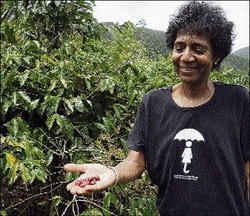A coffee farmer's dream: Dorienne Rowan-Campbell goes organic
Published: Sunday | August 2, 2009

Dorienne Rowan-Campbell says seven years of investment in developing organically grown coffee berries in the Blue Mountains is about to pay off.
Avia Collinder, Business Reporter
Organic coffee grower and small farmer Dorienne Rowan-Campbell says she has been told by Europeans and other tasters that her coffee would make a good espresso.
She is ecstatic to hear this as espressos, with a thicker consistency than drip coffee and a higher amount of dissolved solids, are the base for other high-end coffee drinks including the lattes, cappuccinos, macchiatos and mochas.
It's all gratifying for the organic Blue Mountain coffee grower whose farm and small coffee works has been seven years in a development process leading to possible export.
Currently in midst of talks with the Coffee Industry Board (CIB) for a special farm and dealer's licence, Rowan-Campbell is the smallest of small coffee producers and has chosen the most difficult method of farming - growing her berries without the aid of fertilisers, clear cutting (weeding) and other traditional methods of farming.
"I try to maintain habitats," she said, pointing out that present on her six-acre farm are Mountain Witch, the Fool Pitchary and other flying species, the presence of which permits the farm to be certified as bird friendly.
Birds' input
The birds also reduce coffee berry borer infestation, effectively cutting berry losses by 50 per cent.
CERES or Certification of Environmental Standards, an organic certification agency in Germany, uses the presence of birds as one indication of environmental balance.
Rowan-Campbell, a development consultant turned farmer, expects to get the highest prices for her berry, with organic Blue Mountain attracting the highest prices on the world market.
Roasted beans sold this year for up to US$95 per kilogramme.
Premium grade Blue Mountain, according to the CIB, is now selling for US$33 per kilogramme.
Sold as roasted coffee, the price is approximately US$44 per kilogramme. High Mountain fetches up to US$19.80 for raw beans and about US$25 for roasted.
Production on Rowan-Campbell's Blue Mountain farm has been variable because of hurricane damage every year since 2004.
But she has managed to keep going.
"As an organic farmer I do not have large input costs for materials. I generate most things I need on my farm. My highest costs are transportation and labour," she said.
"I have a very small labour team now and they have been trained at various organic farming training workshops, helping to produce from seed to cup."
In 2008, expenditure on the six-acre farm was "less than $400,000", she said.
The small farmer explains that her interest in farming began with her father, Judge Horace Rowan-Campbell, who also loved farming and grew coffee on the land which she has now dedicated to an organic product.
After an early career in broadcasting and pursuing work with Canada Commonwealth Secretariat as one of its first female directors, she came back to Jamaica in 1988 with the idea of rehabilitating the farm after Hurricane Gilbert, which hit September of that year.
Advice received from friends and onlookers was myriad, including the comment that she would need "a big drum" to mix pesticide.
"I thought that there must be a more sustainable way. I moved into organic farming," Rowan-Campbell recalled. "Everybody thought I was quite mad."
It was not an easy commitment. Apart from the devastating effects of hurricanes in the last seven years, Rowan-Campbell has also suffered from the process of trial and error.
"What it took was a lot of money which I spent somewhat unwisely and learnt a lot of lessons along the way."
She was also unprepared as well for the level of theft of coffee berries and equipment - including water tanks. Roughly 30 per cent of the farm's yield is removed annually by thieves, she said.
Another challenge was the re-education of workers accustomed to using a lot of pesticide.
"They also did not understand why we did not need to clear cut, but instead prune the coffee bush by bush." Retraining did the trick.
Plants are intermixed
On the farm, plants are intermixed with other flora such as asparagus leaf greens and fruit trees which birds and bees like.
Natural vegetation attracts the biological forms needed to maintain healthy habitats.
Rowan-Campbell has also avoided planting as thickly as most people do. "Whatever I plant is what I can sustain," she noted.
The result has been an apparently superior berry in terms of taste and overall quality.
"People from all over the world want my coffee - in Hong Kong, New Zealand, Germany, Canada and US," Rowan-Campbell said.
"However, until I am legally able to trade through CIB I cannot take on these markets. But the market is there."
Christopher Gentles, head of CIB, said last week that the board was currently looking for competent producers of organic coffee.
When such farms are found, he noted, and have been licensed by a certified agency, then the CIB will have no problem certifying 'Jamaica Blue Mountain Organic Coffee'.
Rowan-Campbell is not unduly worried about certification.
She is an active member of the Jamaica Organic Agriculture Moment which runs training programmes for inspectors.
She has also been already certified by CERES.
The farmer stated that her organic venture "is about to become something I have dreamt about, now that certification is possible".
She is hoping to influence others into taking her organic approach.
"I want to change the rules. One can do small farming with a passion and have your quality recognised and recompensed."
avia.collinder@gleanerjm.com




















